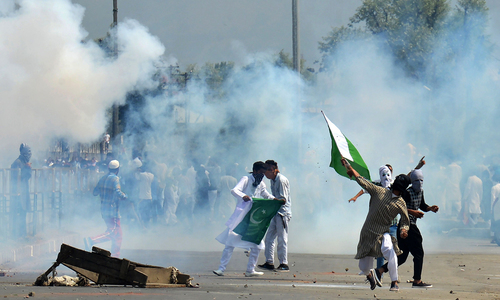'Indian attempts to deny illegal occupation of Kashmir is a travesty of history'
GENEVA: The Permanent Representative of Pakistan to the United Nations in Geneva, Ambassador Tehmina Janjua, on Saturday said India’s attempts to deny its illegal occupation of Jammu and Kashmir is a “travesty of history”.
The Pakistani delegation to the United Nations Human Rights Council also strongly rebutted India’s stance on India-held Kashmir (IHK) and also slammed the Indian state’s interference in Balochistan.
“India had introduced a bill in its own parliament seeking to penalise those who depict Jammu and Kashmir as a disputed territory. This was yet another pathetic effort to alter facts to conform to their own deluded sense of reality,” said Janjua.
Read: Kashmir: why talk to India?
The Pakistani delegate also drew the attention of the Council to the recent speech by a Kashmiri member of the Indian Parliament, who described the current Indian repression as “worse than that by Nazi forces”.
He had also said that if India had any respect of international law, India would end its occupation and let Kashmiris decide their own fate.
“We are not surprised by the remarks of the Indian leadership and its delegation, which would constitute open interference in Pakistan’s internal affairs, especially in Balochistan,” said Pakistan representative in the UN.
She added that India’s behaviour is consistent with its record of interfering in neighbouring countries.
“The sudden Indian focus on Balochistan is consistent with their playbook of seeking to distract attention from their repression in India-occupied Kashmir.”
Janjua pointed out Pakistan had avoided commenting on India’s internal human rights situation.
“Given the persistent, irresponsible flouting of international norms governing inter-state behaviour by India, we are constrained to point out the abysmal human rights record of the Indian government,” said Janjua.
“Pakistan has restrained itself from commenting on the unrelenting repression unleashed by the Indian state in many of its areas. We, instead, only address the situation in India-occupied Kashmir, as that is an international dispute acknowledged in repeated UN resolutions,” she added.
Uptick in violence
In the worst civilian violence to hit the restive region of Indian-held Kashmir since 2010, at least 90 Kashmiri civilians have been killed and thousands more injured in Indian-held Kashmir in clashes with security forces after the killing of a prominent Kashmiri separatist leader Burhan Wani, in a military operation on July 8.
Wani, a 22-year-old commander of Kashmir's largest pro-independence militant group Hizbul Mujahideen (HM), was killed along with two other separatists during a gun battle with Indian government forces.
Wani joined the HM group at the age of just 15, and was viewed as a hero by many in Kashmir. The state's former chief minister Omar Abdullah tweeted after his death that he had become the “new icon of Kashmir's disaffected”.
Witnesses said tens of thousands attended his funeral despite a curfew imposed by Indian authorities, chanting independence slogans.
Also read: United States to urge India for holding talks with Pakistan over Kashmir issue
Indian government troops in IHK have reportedly fired live ammunition, and used pellet guns and tear gas to control anti-government protesters.
Indian Prime Minister Narendra Modi had called an emergency meeting to discuss escalating violence in India-held Kashmir amid anti-India protests.
Pakistan's Foreign Office has also condemned the violence in Indian-held Kashmir.
HM is one of several groups that for decades have been fighting around half a million Indian troops deployed in the region, calling for independence for Kashmir or a merger with Pakistan. Indian paramilitary soldiers patrol during curfew in Srinagar.
Kashmir has been divided between rivals India and Pakistan since 1947, but both claim the territory in its entirety.
Tens of thousands of people, mostly civilians, have died in the fighting since 1989.
Violence had sharply declined in recent years following a major crackdown by the hundreds of thousands of Indian forces deployed in the region.
But a recent uptick in militant attacks has galvanised frustrated young Kashmiris, majority of whom deeply resent the Indian military's presence.















































